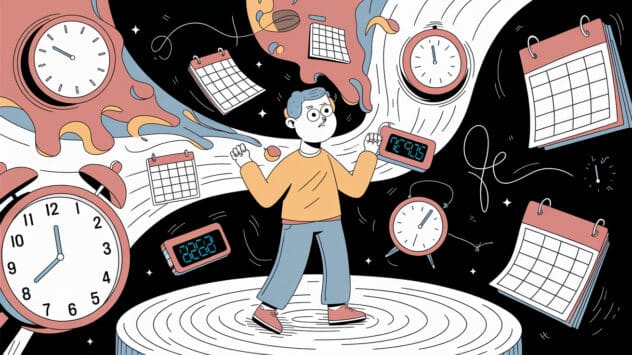ADHD time blindness: Why We’re Always Living in the Future or Past
ADHD time blindness isn’t about sci-fi. It’s about how ADHD turns time into a chaotic, unpredictable mess. One minute, you’re hyperfocusing so hard you forget to eat for six hours. The next, you blink, and somehow it’s three weeks later, your bills are overdue, and your coffee is still sitting in the microwave from yesterday.
Time perception with ADHD can feel unpredictable. Sometimes it’s as if hours disappear in an instant, while other times the clock drags on forever. But why does ADHD time blindness make time feel so inconsistent? And more importantly, how can we hack our brains to actually experience time in a way that works for us? Let’s dive in.
Why ADHD Brains Are Chronically Stuck in the Future or the Past
For neurotypical people, time moves in a neat, logical progression. There’s a clear before, now, and after. But for ADHD brains? Time is either right now or not now, which is a completely useless system for things like paying rent, remembering birthdays, or functioning as an adult.
Unlock peak brain performance with science-backed biohacks. Join free now & get your guide for just £4.99 (45% off)!

- ADHD Time Blindness: This is the lovely feature of ADHD where you genuinely cannot tell if something happened an hour ago or a decade ago. Your sense of time is so warped that “I’ll do that in five minutes” could mean literally anything between immediately and three months from now.
- Hyperfocus Blackouts: Ever sat down to do a “quick task” and then resurfaced from a Wikipedia deep dive five hours later, wondering why it’s dark outside? Congratulations, you just experienced ADHD time blindness in action.
- Future Anxiety: You know that thing where you lie awake at night panicking about things that haven’t even happened yet? That’s because your brain is running mental simulations at 300% speed, none of them useful.
- Executive Dysfunction’s Greatest Trick: Your brain knows that deadlines exist. It knows what time is. It just doesn’t feel real until there’s an actual, immediate consequence looming over you. That’s why most projects only get finished at 3 AM the night before they’re due.
Your Mental Time Machine: Powered by Intrusive Thoughts and Procrastination
So if ADHD time blindness is basically an ongoing time travel experiment gone wrong, what does that look like in daily life?
- The Future Tripper: Spends so much time planning, worrying, and overthinking the future that they forget to actually do anything in the present.
- The Nostalgic Historian: Gets completely lost reminiscing about past conversations, past mistakes, and that one embarrassing thing they did in 2007.
- The Hyperfocus Rabbit Hole Dweller: Schedules an hour to “just check emails” and somehow ends up learning everything there is to know about medieval swordsmithing instead.
- The Last-Minute Sprinter: Waits until the absolute last second to do anything because their brain simply will not register time passing until it’s a full-blown crisis.
If any of this sounds familiar, don’t worry—you’re not alone. In fact, if ADHD had a national anthem, it would be the Doctor Who theme song.
Biohacks to Stay Present (Or at Least Fake It Better)
So, how do we stop ADHD time blindness from hurtling us between anxiety and hyperfixation? The key is tricking your brain into caring about time in real time.
- External Time Anchors: If your brain refuses to acknowledge time, force it to. Set alarms, use visual timers, and create external cues that force your brain to register passing minutes. (Yes, that means wearing a watch and actually looking at it.)
- Body Doubling: Doing tasks alongside another person helps anchor you in real time and prevents your brain from launching into the time vortex. Think of them as your designated time cop.
- The 10-Minute Rule: Struggling to start something? Tell yourself you’ll do it for just 10 minutes. Your brain won’t register a full hour, but it can handle 10 minutes. And once you start, momentum usually keeps you going.
- Break Time Into ‘Now’ Chunks: Instead of seeing your day as a giant overwhelming mess, break it into now tasks. What needs to happen in the next five minutes? The next hour? Trick your brain into thinking time is bite-sized instead of an endless abyss.
- High-Stakes Gamification: Give yourself ridiculous fake deadlines or make tasks into a challenge. (“If I don’t answer these emails in 15 minutes, the house explodes.”) Your brain thrives on urgency, so manufacture it.
Final Thoughts: How to Stop ADHD Time Blindness (Or At Least Hack It)
Let’s be real; ADHD means time will always be a little wobbly. But with the right biohacks, strategies, and sheer force of will, you can at least stop living permanently in the past or future. So next time you catch yourself spiraling through time, try a few of these tricks. And if all else fails, just set 15 alarms and pray for the best.
Join Our Community
For more science-backed, sarcasm-infused ADHD biohacking strategies, join our forums and stay in touch.







